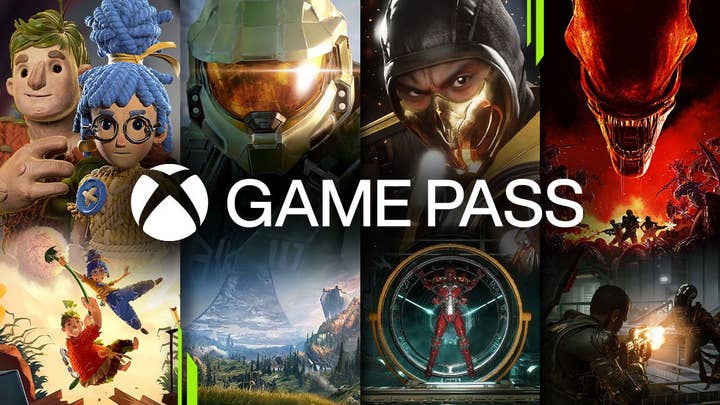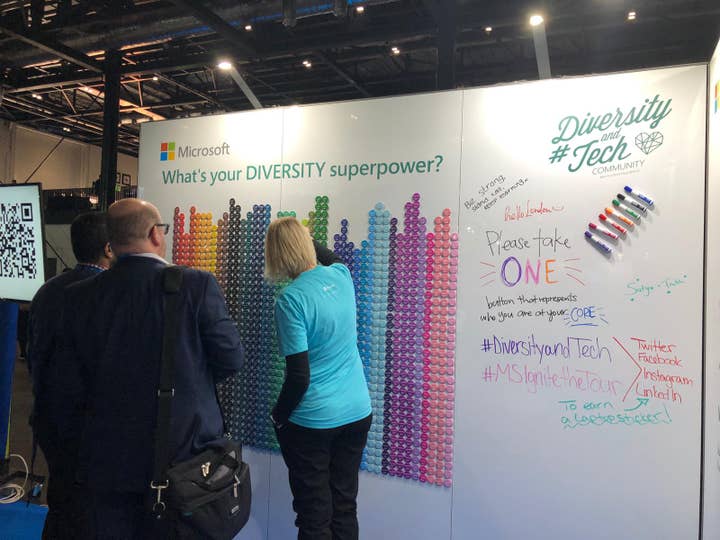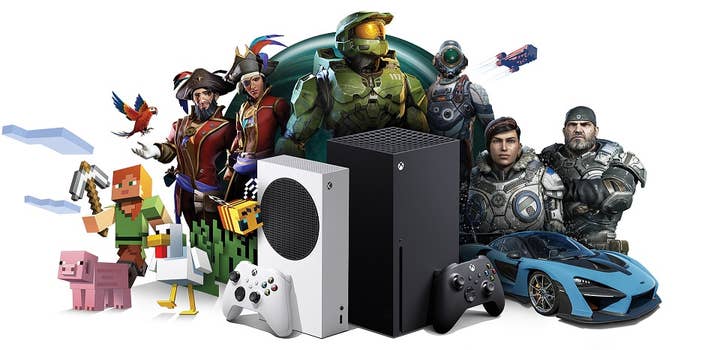Unanswered questions about Microsoft's Activision Blizzard deal | Opinion
A look at some of the implications and possible knock-on effects of yesterday's massive news
Microsoft is buying Activision Blizzard in a massive $68.7 billion deal that will impact a lot more than just those two companies. There are plenty of question marks around the deal and how it will play out over the coming months. Here are a few that we think are particularly pressing.
Will the deal be approved?
Virtually any deal of this size is likely to raise antitrust concerns, but as our own Chris Dring pointed out yesterday, the acquisition of Activision Blizzard is as much about bolstering areas where Microsoft is not overwhelmingly strong to start with, like mobile and PC.
Even in the console space, Xbox is a clear third place right now. Losing Activision Blizzard would hurt Nintendo minimally, and if Microsoft were to pull Call of Duty from PlayStation platforms (a scenario I don't think is entirely likely), the question is not whether Sony would still be able to compete. The question would be whether that alone would meaningfully close the gap between Sony and Microsoft.
If Microsoft were to pull Call of Duty from PlayStation platforms, the question is not whether Sony would still be able to compete. The question would be whether that would meaningfully close the gap between Sony and Microsoft
This deal doesn't appear to me to give Microsoft anything approaching a monopoly in any specific market no matter how narrowly I want to define it. Halo, Overwatch, Doom, and Call of Duty are a significant chunk of the console AAA shooter market, but in a genre with Fortnite, PUBG, Destiny, Far Cry, Battlefield, Borderlands, Apex Legends, Rainbow Six and so many more, I don't know if consumers are hurting for options there.
Microsoft even emphasized the continued competition it will face in announcing the deal, taking the unusual step of naming names in saying that "When the transaction closes, Microsoft will become the world's third-largest gaming company by revenue, behind Tencent and Sony."
That doesn't mean I don't have concerns about whether this deal will ultimately be anti-competitive. Industry consolidation naturally raises concerns on that front, especially consolidation on a scale like this. I'm particularly concerned about what this means for Microsoft's attempts to turn Game Pass into the oft-considered but as-yet-unachieved "Netflix for Games."
"Our vision is for a river of entertainment where the content and commerce flow freely, driving a renaissance across the entire industry to make games more inclusive and accessible to all," Microsoft CEO Satya Nadella said in an investor call after the deal was announced. "And together with Activision Blizzard, that's what we will be able to deliver. Removing these barriers will only become more important as the digital and physical worlds come together and the metaverse platforms develops."

Right now Game Pass has a lot of buzz and 25 million subscribers. The potential for that number to grow is enormous with an acquired Activision Blizzard. Fold the World of Warcraft subscriber base into it, bring in millions of Call of Duty fans by including new releases on day one, and then throw season passes for King titles in there and you have the potential to not only boost Game Pass subscribers among each of those pillars, but greater opportunity to bounce users between Microsoft-owned brands, reducing Game Pass' reliance on external developers and creating a one-size-fits-all offering that makes Game Pass the default destination for video games writ large. That then could be an anti-competitive nightmare with a host of negative knock-on effects for developers and consumers alike.
But that's a hypothetical scenario, and even with this deal going through, a whole lot would have to break just right for Microsoft to get from here to there. And even then it may not completely forestall competition, much in the same way Netflix's streaming dominance spawned a host of would-be competitors. (And as much I enjoy Ted Lasso and want to watch the new Matrix, the only truly significant competition for Netflix to date seems to be Disney+, a massive investment from a similarly monolithic media outfit with a dragon's hoard of owned IP to pull from).
The worrying size of an acquisition in and of itself won't stop it from happening
Microsoft talking about this as a metaverse platform play also positions it as being in natural competition with a slew of companies pursuing the next big thing, including Facebook/Meta, which is currently facing its own antitrust lawsuit from the Federal Trade Commission. Would regulators think twice about hobbling Microsoft's ability to compete against Facebook in this emerging space?
It's also possible regulators would approve the deal but ask for concessions, such as when ESPN-owning Disney had to agree to sell Fox's regional sports networks before it was allowed to acquire the fellow media titan. But again, what specific market does this give Microsoft an anticompetitive degree of control in? What could it be asked to divest that would make sense?
The deal itself is massive on a scale that will draw loads of scrutiny, but if Disney was able to acquire Fox for $71.3 billion -- a trifling $2.6 billion above the $68.7 billion being paid for Activision Blizzard, barely more than a single Minecraft -- the worrying size of an acquisition in and of itself won't stop it from happening.
No comeuppance for Kotick?
Bobby Kotick is staying on board as CEO, in what sounds like a perfectly normal bit of acquisition etiquette. The old CEO sticks around, makes sure the transition goes smoothly, and then quietly ducks out once things are settled.
The issue is that Kotick is not a normal CEO. He's been embattled for months as a result of multiple government lawsuits over gender discrimination at the publisher and a Wall Street Journal report that he threatened to have an assistant killed, among other things. Investors and employees and media outlets have called for his firing or resignation.
When that Wall Street Journal report came out, Xbox head Phil Spencer sent a letter to his staff expressing his horror at what happened at Activision Blizzard and saying he was "evaluating all aspects of our relationship with Activision Blizzard and making ongoing proactive adjustments."
Buying Activision Blizzard gives Spencer the ability to improve the situation for Activision Blizzard workers, so that could be good. But it also means that Microsoft and Spencer, which have been very vocal in recent years about the need for a more diverse and welcoming industry, are going out of their way to hire a man credibly accused of things that they would likely fire any of their existing employees for.

On top of that, Microsoft is buying the publisher at a 69% premium to the share price, and Kotick holds at last count 3.9 million shares of the company's stock, so he stands to make almost $371 million as a shareholder. And if Microsoft were to fire Kotick upon closure of the deal "without cause or good reason," Kotick would receive a payout of almost $293 million. Under Kotick's deal, "cause" would likely come down to whether Kotick "engaged in willful misconduct or gross negligence in connection with the performance of his duties that has caused or is highly likely to cause severe harm to [Activision Blizzard]" or "was intentionally dishonest in the performance of his duties under his employment agreement and such dishonesty had a material adverse effect on [Activision Blizzard]," which sounds about right to me but I suspect he would contest in court, particularly with that much money riding on it.
It seems much more likely that Microsoft simply lets Kotick play out the string on his current contract, which runs through March of 2023.
So assuming Spencer has a genuine desire to clean up Activision Blizzard, letting Kotick do the normal CEO transition away from the company seems like a pragmatic course of action. It doesn't give anyone the satisfaction of seeing Kotick held accountable for the people hurt by his leadership, and it gives him a golden parachute, but it could improve material conditions for Activision Blizzard employees and letting Kotick stick around avoids giving him another few hundred million dollars.
There's something to be said for the pragmatic approach, but frankly this industry is starved for accountability in the executive ranks.
What does this do to the push for unionization?
Developer support for unionization has been growing for years. With every scandal at a Riot Games or Ubisoft full of truly horrific stories that ended with the CEO (and often other senior execs) who built the culture still in charge at the end of the day, the calls for unionization grew louder.
Activision Blizzard's scandal was a sort of perfect storm. Kotick has long been an unsympathetic figure in gaming, once boasting to investors that his goal was to take the fun out of making games. A government lawsuit carries more weight (and more potential for real impact) than your average media report based on current and former employees. The company's initial response to the suit was laughably bad, avoiding the artificial contrition of other exposed employers for belligerent denial. Activision Blizzard developers spoke out against their employer, staging a walkout and establishing the ABK Workers Alliance to give themselves a voice.
A lawsuit from the US Equal Employment Opportunity Commission followed, as did an investigation from the Securities and Exchange Commission, and multiple press reports detailing further abuses and wrongdoing, some committed by Kotick himself.
The workers group asked Activision Blizzard employees to sign union cards, and company leadership moved quickly to discourage employees from organizing.
Combine Kotick's decades of ill will with a seemingly unending parade of demoralizing news for Activision Blizzard employees, a general lack of remorse for the things he had done wrong, and clear signals from the board of directors that there was very little appetite for removing him, and it seemed like we might have hit a tipping point.
Kotick's continued presence atop the organization seemed like a splinter that would continuously agitate employees until unionization was inevitable
Kotick's continued presence atop the organization seemed like a splinter that would continuously agitate employees until unionization was inevitable. Frustration combined with a lack of hope for improvement would push Activision Blizzard developers on the fence about unionization to sign their cards because it was the only way to be heard. In an industry where surveys show that more than half of developers support unionization, for a minute there I wondered if we might see the first major North American game company unionize. The potential domino effect that could have on developer wages, treatment, and unionization efforts across the industry would be seismic.
But with Microsoft taking over, the unionization effort risks losing the adversarial focal point that Kotick gave it. Microsoft certainly has plenty of skeletons in its own closet, but at the very least, the company has done a much better job of managing the bad press out of it.
For its part, the ABK Workers Alliance said the news of the acquisition was surprising, but changes nothing.
"We remain committed to fighting for workplace improvements and the rights of our employees regardless of who is financially in control of the company," the group said on Twitter. " We will continue to work alongside our allies across the gaming industry to push for measurable change in an industry that desperately needs it. We called for the removal of Bobby Kotick as CEO in November for shielding abusers and he still remains CEO as of this writing.
"The strike for Raven QA is in its fifth week, and our striking staff has still not received response from leadership regarding our request to negotiate. And finally, 3 out of 4 of our original collective demands to improve the conditions of women in our workforce have not been met. Whatever the leadership structure of the company, we will continue our push to #EndAbuseInGaming, and appreciate the outpouring of support we've experienced in the last year."
We may still be headed for unionization, but the odds of it starting with Activision Blizzard seem a little slimmer than they did last week.
Who's next?
Consolidation often begets consolidation. And a big splashy deal like this one can put pressure on competing companies to respond. (We'll excuse Nintendo from this conversation because it doesn't really have a track record of reacting to what the competition is doing and its success has relied so heavily on doing its own thing that taking an acquisition or merger offer seems out of character as well.)
As of Wednesday morning, Sony shares were trading down a whopping 13%, apparently just because investors saw the Microsoft deal as good for Xbox and bad for PlayStation. Is Sony really worth $20 billion less today than yesterday? Has a Zynga and a Bethesda's worth of value just evaporated from the company?
In reality, of course not. But on paper, yes. And publicly traded companies tend to care a whole lot about that "on paper" assessment, as they often optimize for raising share price rather than something so mundane and inconsequential as profitability.
So does Microsoft buying Activision Blizzard demand a response? What would that even look like? The Activision Blizzard deal makes sense for Microsoft on a number of levels, but what targets are out there for Sony?
Sony has held a favorable edge in the console space for nearly a decade now based on the strength of its traditional gaming business. Almost everything has been about selling boxes for people to play games on. It has dabbled in PC, in mobile, and in services like PlayStation Now, but those have always been tentative moves. PlayStation Now pre-dated Game Pass by years, and Sony is just now preparing to focus on it in any meaningful way (if unconfirmed reports are accurate).
Does Sony double-down on its console business with a third-party publisher whose work can be made PlayStation-exclusive? Does it try to play catch-up with Game Pass, even though Microsoft has typically held an edge on Sony in essentially any online functionality ever since the debut of Xbox Live and has been aggressively promoting and investing in Game Pass for years now? Does it acquire a presence in mobile gaming, or a PC-focused publisher? Would any of those be all that additive to a company whose expertise and focus has been so squarely in the traditional console world?
I'm unsure there's actually a reasonable response for Sony to make here. Outside of deals that feel like games industry fan fiction -- Nintendo, Valve -- most of the potential acquisitions I can think of would carry more than a whiff of panic. And investors may react even more harshly to a short-sighted multi-billion dollar binge, especially with the premium over share price that companies like Activision Blizzard and Zynga are commanding now.

